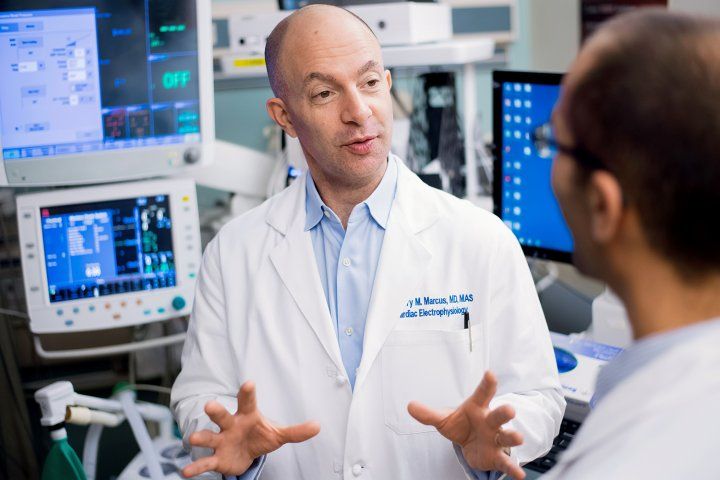
A daily alcoholic drink for women or two for men might be good for heart health, compared to drinking more or not drinking at all. But while there is some evidence that drinking in moderation might prevent heart attacks, now a randomized, double-blinded clinical study of 100 heart patients has added a new wrinkle to the contours of the debate over alcohol and heart disease.
UC San Francisco researchers found that alcohol has an immediate effect on the heart in patients with atrial fibrillation (AFib), the most common life-threatening heart-rhythm disorder.
In the study, published online Jan. 27, 2021, in the Journal of the American College of Cardiology: Clinical Electrophysiology, electrical properties that drive the muscles of the heart to contract changed immediately in patients who were randomly assigned to an infusion of alcohol maintained at the lower limit of legal intoxication, compared to an equal number of control subjects who instead received a placebo infusion.
According to senior study author Gregory Marcus, MD, professor of medicine in the Division of Cardiology at UCSF, “The acute impact of exposure to alcohol is a reduction in the time needed for certain heart muscle cells in the left atrium to recover after being electrically activated and to be ready to activated again, particularly in the pulmonary veins that empty into the left atrium.”
“Although epidemiological studies have found an association between self-reported alcohol consumption and the development of an atrial fibrillation diagnosis, ours is the first study to point to a mechanism through which a lifestyle factor can acutely change the electrical properties of the heart to increase the chance of an arrhythmia,” Marcus said. The same changes caused by alcohol infusion in the study have earlier been associated with episodes of AFib in previous computer models and animal studies, he said.
In AFib the orderly pumping of blood through the atria, the heart’s upper chambers, is disrupted. Pumping normally is driven by regular waves of electrical signal conduction along well travelled circuits that form in the heart between cells in the muscle tissue, but in AFib electrical properties change within the atria and electrical signals travel chaotically through the chambers’ muscles, all of which can themselves conduct and perpetuate waves of electrical activation. As a result the atria pump blood inefficiently. Those who are stricken with AFib may feel the heart flutter, pound, or skip beats.

The number of people in the U.S. with AFib is approaching 12 million, and the condition leads to 454,000 hospitalizations yearly, according to the Centers for Disease Control with Prevention. AFib contributes to about 158,000 U.S. deaths each year and is a leading cause of stroke, as blood clots can form inside fibrillation-prone atria. More commonly AFib causes fatigue, weakness, dizzy lightheadedness, difficulty breathing and chest pain.
The study patients were all undergoing a scheduled, standard “catheter ablation” procedure, the most effective method to suppress atrial fibrillation episodes. This procedure targets elimination of the electrical connection between the pulmonary veins and the left atrium, the same area noted to be affected exposure to alcohol in the current study.
Preparation for ablation surgery already required placement of catheters and electrodes in the heart chambers to monitor and pace the heart and destroy targeted tissue. For the study, investigators measured the refractory period needed by cells to recover before they could transmit electrical signals again, as well as the speed of signal conduction from one point to another within the heart. They also applied a stimulus to greatly increase the likelihood of inducing a transient AFib episode.
The speed of electrical conduction through the upper chambers did not change significantly in the study, but in comparison to placebo, alcohol infusion resulted in an average reduction of 12-milliseconds in the refractory period for tissue in the pulmonary vein, and also reduced the refractory period in significantly more sites throughout the atria. During the procedure, the number of induced AFib episodes did not differ significantly between alcohol and placebo infusion groups.
“We were able to induce AFib in large numbers of patients in both groups, but our artificial methods of inducing AFib may have overwhelmed any observable differences between the groups,” Marcus said. “Alternatively, it may be that there is a delay between the change in electrical properties caused by alcohol and the increased likelihood of triggering AFib.”
“Patients should be aware that alcohol can have immediate effects that are expected to increase risk for arrhythmias,” Marcus concludes.
Additional UCSF study authors include Eric Vittinghoff, Gregory Nah, Joshua Moss, Randall Lee, Byron Lee, Zian Tseng, Tomos Walters, Vasanth Vedantham, Rachel Gladstone, Shannon Fan, Emily Lee, Christina Fang, Kelsey Ogomori, Trisha Hue, Jeffrey Olgin, Melvin Scheinman, Henry Hsia and Edward Gerstenfeld.
Funding: the National Institutes of Health funded the study.
Disclosures: Marcus has been supported in his research by the Patient-Centered Outcomes Research Institute, Medtronic, Eight, Jawbone, and Baylis, and is a consultant and holds equity interest in InCarda.
from ScienceBlog.com https://ift.tt/3t5t3Vz

No comments:
Post a Comment